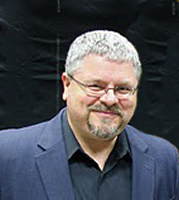Concerts entirely devoted to the music of a single composer are not that rare – think all-Beethoven, all-Brahms, all-Wagner evenings. But concerts devoted to works of single living composers are far less common. For that reason if for no others, the program offered by the Mallarmé Chamber Players at Durham’s Eno River Unitarian Universalist Fellowship on Saturday evening was special. That it involved significant works for solo singers, variously accompanied, by J. Mark Scearce made it still more special, never minding the several puns on his name used in the program and the MCP’s advertising, “Good Music Is Sc[e]arce” being chief among them. Toss in three outstanding vocalists and two instrumentalists of exceptional ability and the level moved up several more notches. Yes, it was special on many levels.
Music by Scearce has been enriching the lives of the region’s residents since the late ’80s, when he came to NC as the spouse of the coloratura star of the National Opera Company, Leda Asher Yager, an artist of exceptional technical and interpretive skills in wide-ranging repertory now mostly known as one of the leading performers of her husband’s music. She had the “real” job back then; he pieced together part-time gigs at several institutions of higher learning, which helped him spread his artistic gospel far and wide. And they gradually fell in love with the state, missing it when away for assignments in Hawaii, Texas, and Maine, and becoming more and more attached during stints in Hickory and, more recently, in Raleigh, where he is Director of Music at NCSU. (He talked of these things and much more in a fascinating introduction to the concert, the text of which we are pleased to present here.)
His output in all forms – songs, opera, chamber, orchestra, solo instrumental, choral, for children – is extensive, a point hammered home in his comment that the program given at ERUUF represented perhaps a quarter of his songs. In this genre as in all the others, Scearce is no modernist in the sense that gave “contemporary music” a bad name not too long ago. His uncanny ability to create melody, to marry melody to words, and to forge combinations of the two to convey emotions or drama or suspense or awe or spirituality or what-have-you has long set him apart from many of his peers. There were numerous examples of this ability during the program, which consisted of three cycles for solo voice – Back by the Roadside (1997, with poems by Whitman), sung by mezzo-soprano Karyn Friedman; Six Songs from ‘The Hopper Collection’ (2001, with poems by Joseph Stanton), sung by baritone Scott MacLeod; and Bright Star (2009, with poems by Keats), sung by soprano Leda Scearce. The first two were deftly accompanied by pianist David Heid; the latter, by harpist Jacquelyn Bartlett.
All these artists are at the very tops of their respective games, and in this particular context they all seemed exceptionally well-matched and well-meshed, too. These are intensely personal songs in which the composer has often bared his soul – and the interpreters made the most of the opportunities the music offered them in terms of the songs’ wide-ranging emotions, whimsy, or wit, as appropriate. There was much in these songs that suggested their place in the continuum of great vocal music of the past – opera, for sure, but the long lines of Handel in particular (even in some very brief numbers), and also the greatest masters of the past, including but not limited to Schubert. (I am not saying that these works sound like songs of other composers but merely that Scearce has mastered the art of marrying words to music in truly miraculous ways.)
The second half of the program involved all five musicians plus narrator David Hartman, who left Good Morning America 25 years ago, in the premiere of Scearce’s amazing cycle of mostly short songs set to short poems by Whiteville, NC, native A.R. Ammons. 35 @ 35 – referring to the number of poems and the composer’s age when he set them in 1996 – was the “big” work of the evening, dramatically rendered by singers often in motion and always engaged with the others whether performing or not. I suppose it was helpful to have heard the poems read as poetry before they were sung although I am thinking one would not want the narration as an integral part of the eventual recording. (The concert was recorded but there was a glitch resulting in the omission of one song, “Stills,” so at least that number will have to be re-done.)
The composer had previously set poems by this remarkable author, apparently having “discovered” him while away from NC, in Hawaii. I, too, “found” Ammons when away from NC, in my case, in Newport, RI. He spoke of our state not in overt ways but much more subtly, inviting contemplation of the character of our people. It is the character of these poems that Scearce has captured for us and that the participating artists projected so admirably on this occasion. Three cheers – or five – or six or so.











